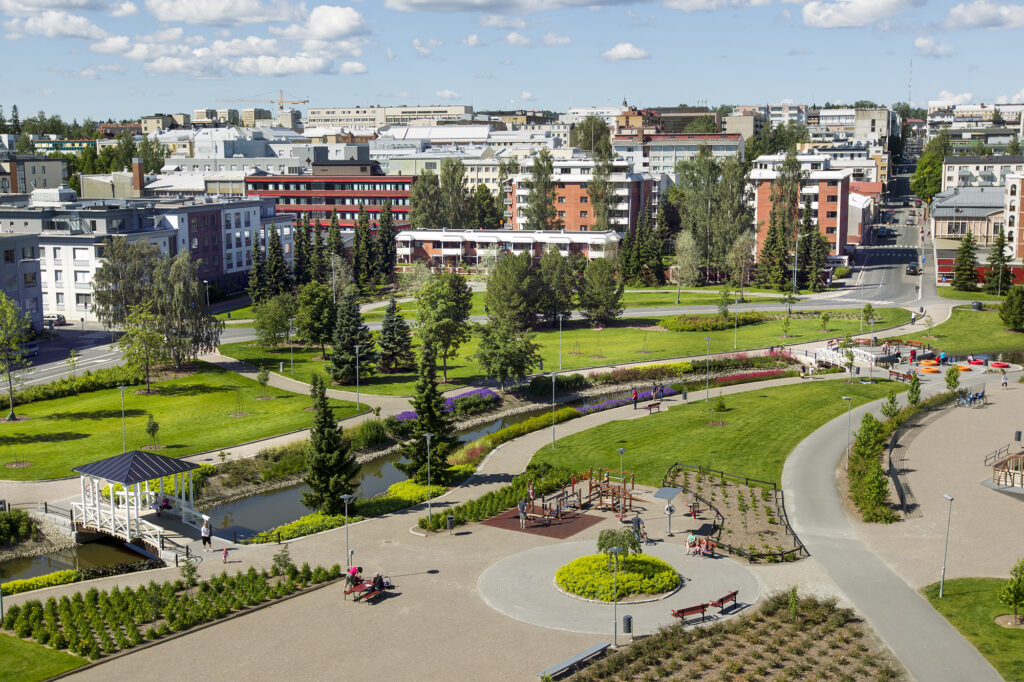Urban Policy, Contractual Relationships, and Municipal Finances

Big cities should play a bigger role through contractual arrangements with the state. The national importance and special role of large cities must be recognised and taken into account in various contexts. Kuopio has a 12-year land use, housing and transport agreement and an 8-year innovation ecosystem agreement with the state. The continuity of these agreements must be ensured.
-
The land use, housing, and transportation agreement between the Kuopio MAL Agreement Area and the state was signed in September 2021. The goal is to develop climate-smart urban regions, increase housing production in easily accessible areas, and promote sustainable modes of transportation, such as public transport, in the transportation system. The corresponding ministry responsible is the Ministry of the Environment.
The agreements support the vitality of urban regions and the flexible organisation of everyday life. The land use, housing and transport agreements should continue to be valid for a 12-year period, and the three new agreement regions Jyväskylä, Kuopio and Lahti should be equal with the former regions when it comes to receiving support funding. The purchase prices of new state-subsidised housing have also risen in the new urban areas covered by the agreements and the Housing Finance and Development Centre of Finland (ARA) should more strongly consider the rising project costs. The goal is to start new construction also in the current situation.
The agreement is available in Finnish on the website of the Ministry of the Environment.
Further information:
- Deputy mayor Jari Kyllönen, jari.kyllonen@kuopio.fi, +358 44 718 5501
- Housing director Katri Hiltunen, katri.hiltunen@kuopio.fi, +358 44 718 5050
- Contact manager Tero Piippo Kuopio, tero.piippo@kuopio.fi, +358 44 718 2125
-
Innovation ecosystem agreements between the state and cities develop innovation ecosystems, i.e. close cooperation networks, strengthen knowledge spearheads and increase the impact of research, development, and innovation activities.
The main idea behind the ecosystem agreements coordinated by the Ministry of Economic Affairs and Employment are innovative cities that build on their strengths to harness the opportunities of digitalisation, new technologies and carbon neutrality to drive economic renewal and sustainable cities. The launch projects for Kuopio’s ecosystem agreement received funding decisions and launched their operations in September 2021.
The focus is on Health and wellbeing technology and Water. The ecosystem agreement between the City and the state supports the City’s innovation-driven growth, competitiveness, economic development, employment, and internationalisation.
Further information:
- Arto Holopainen, Innovation manager, arto.holopainen@kuopio.fi, +358 45 139 3996
- Anu Häiväläinen, Business agent, anu.haivalainen@kuopio.fi, +358 44 718 2036
-
Central cities must play an important role in the economic development of eastern Finland. Cities are key builders of partner networks and developers of operational conditions of their regions. As part of the vision work for eastern Finland, the central cities propose that a joint city agreement be prepared with the central cities of the regions under the leadership of the Ministry of Economic Affairs and Employment to strengthen the vitality of the region.
Further information: Strategy director Sirpa Lätti-Hyvönen, sirpa.latti-hyvonen@kuopio.fi, +358 44 718 2132
-
The financial position of municipalities must be safeguarded: The financial position of municipalities must not be weakened by the introduction of wellbeing services counties: Municipalities need sufficient state support to cope with long-term crises. Municipalities should not be given new obligations. The social welfare funding model must take into account the actual funding requirements for the organisation of social welfare, health care and rescue services in the various regions as comprehensively as possible, the differences in production costs between the various regions, and the specific characteristics of the regions.
Further information:
- Finance director Marja-Leena Martikainen, marja-leena.martikainen@kuopio.fi, +358 44 718 2153
- Head of financial planning Jaana Kuuva, jaana.kuuva@kuopio.fi, +358 44 718 2788
-
TE Services reform 2024 must be implemented in a flexible manner and the effective practices already in use in the area must be safeguarded:
Municipalities have an inherent role to play in assembling and leading their employment and vitality ecosystems. The resources needed for reform must be secured. To ensure the success of the transfer of TE services, it is important that the proposed changes to the financial responsibility for unemployment protection are transferred to the overall social security reform and scheduled at a later date.
A sufficiently long transition period will give municipalities and employment regions time to build functioning local employment services. The proposed changes to financial responsibility should be postponed to a later date, for example to the beginning of 2027, provided that the legislation on services to clients has been reformed by then. The TE reform must be implemented in such a way that the financial position of municipalities is safeguarded.
Further information: Employment services director Pirjo Oksanen, pirjo.oksanen@kuopio.fi, +358 44 718 1711